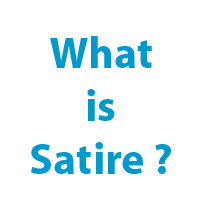What is Satire?
Satire is a literary art that uses irony, wit and sometimes sarcasm evoking laughter as a powerful weapon against the vices and follies of the humanity for the purpose of reformation through ridicule. Although satire uses comic elements but it differs from comic as comedy only evokes laughter, while satire uses laughter as a weapon against individual (in 'personal satire'), a class, an institution, a nation or the whole race of man.

Satire may primarily create laughter but essentially has a moral purpose. It is a typical function to correct the folly or immorality in humanity or the human institutions. Satire would not be directed at physical deformities of individuals but oriented towards the reform by ideally provoking a kind of response of fulfillment. Satire has been justified as a corrective of human vice and folly by those who practice it.
English satire has been written in every period regarded as a favored classical literary genre beginning with the Middle English Ages, along with the most famous and effective satires of the seventeenth and eighteenth centuries, and the present. Satires persists today, particularly in works (including films) whose subjects are political figures, situations, or institutions.
Satire can be categorized into two major categories – direct (formal) and indirect. Direct satire is spoken out in the first person “I” addressing either to the readers or to the character within the work itself, who is called the adversaries with the function to provoke and guide the satiric speaker’s comments. These two types of satires are named from the great Roman satirists Horace and Juvenal. Horatian satire pokes fun at humble foils with a witty, even indulgent tone, and Juvenalian satire, denounces human vice and error in dignified and solemn tones.
Indirect satire is cast in the form of a narrative instead of direct address. One type of indirect satire is Menippean satire. This is named for its Greek originator, the philosophical Cynic Menippus. It is sometimes called Varronian satire. It is the most common form of satire as its effect is achieved not through direct condemnation but rather through modes of presentation and representation. For instance, authors may make up their points through exaggeration and non-sequitur. Furthermore, satire is often as pointed in what it doesn’t say as in what it does.
Published on 19 Jan. 2018 by Kedar Nath Sharma
